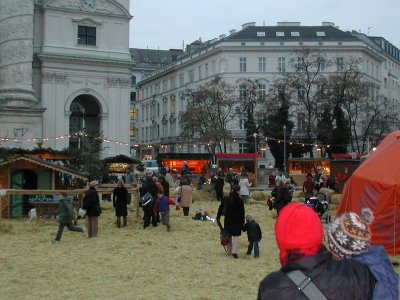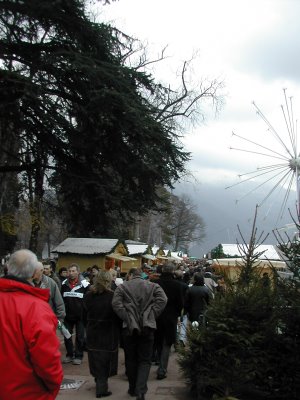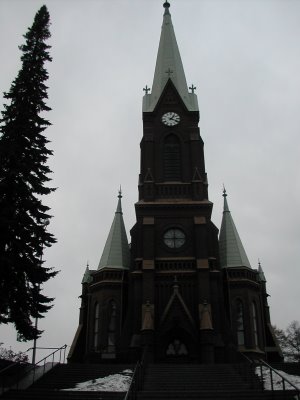A nature lover who adores humanity and humility with embracing life-long learning. I love nature, in particularly mountain and sky. During my leisure time, I enjoy reading, writing, music as well as musical plays. Cooking, house cleaning, swimming, jogging and gym are my mind relaxation.
Sunday, December 31, 2006
Why the cry of Burma has yet to be cared whereas cry of Iraq continues
I do not have any feeling towards Saddam Hussein's execution although he was said a tyrant and had killed many innocents during his ruling of Iraq. I believe my indifference was caused by the injustice invasion of US on Iraq.
If the US invaded Iraq for the building of Iraq's democracy, why the US does not take a similar action on Burma???
Thursday, December 28, 2006
Christmas Markets in Switzerland, Austria and France
Wednesday, December 27, 2006
水果应该买小不买大?
"对心血管健康非常有益的多酚类物质主要存在于果实的外层部分,包括外层组织、叶片以及果皮当中。维生素C的分布也有同样的规律。这是因为,太阳是植物的能量之源,植物的“养分合成基地”也在接近阳光的地方。因此,甚至在同一种果实中,也因为阳光照射状况的差异,健康成分的含量也会有所不同。
樱桃番茄同样符合以上规律,它的类黄酮含量明显高于普通大番茄,因为它和阳光的接触面比较大。从维生素C来说,因为果表面的比例较高,维生素C丰富的部分也随之增加,比大番茄更有优势。
从膳食纤维来说,体积很小的樱桃番茄含有更大比例的果皮。而番茄的果皮是膳食纤维的极好来源,具有一定的防癌作用。显而易见,小番茄在这方面得分更高
同样的规律,体积比较小的果实,实际上营养价值更高。
比如说,苹果营养价值最高的地方是红色果皮下面的果肉;李子、茄子、葡萄等有色水果,都是果皮附近营养价值最高。而柑橘类的皮下白色组织中含有最高的类黄酮物质,显然小金桔连皮吃是非常可取的...
只有草莓、樱桃和桑椹等,从里到外的养分含量都差不多。但是,它们本身就属于那种体形很小的水果。
明白了这个道理,我们就不必去追求个头更大的果实,只需要在正常成熟的前提下,选择体积正常或偏小的水果品种,就可以获得更多的养分!这样,果农们也就没有必要去一味追求大果,喷洒各种“促长剂”、“膨大剂”了,岂不是营养健康两全其美么。 "
Tuesday, December 26, 2006
A joint effort against Global Warming
Monday, December 25, 2006
Glühwein
Glühwein in the German Language is called "Mulled wine" in the English Language.
It is hot red wine boilt with spices and honey. It is a traditional drink during winter, and especially around Christmas, to warm up.
I personally prefer Glühwein in Switzerland. I find Glühwein in Denmark is too strong and thus it is bitter; whereas Glühwein in France is too sweet for me (Perhaps it is because French people like desserts?).
Ingredients:
1 bottle of dry red wine (750 ml)
one lemon
2 sticks of cinnamon
3 cloves
3 tablespoons of sugar
some cardamom (or ginger)
Heat the red wine in a pot (don't boil). Cut the lemon into slices and add to the wine. Then add the cinnamon, cloves, sugar and a little cardamom (to taste). Heat everything for about 5 minutes - do not boil - and let stand for about an hour. Before serving, reheat and strain. Serve in prewarmed glasses or mugs.
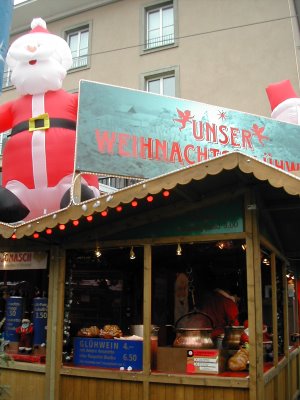
"The Devoted Friend"
An ironic frame story about "friendship".
I.
One morning the old Water-rat put his head out of his hole.
He had bright little eyes and a long black tail. The little yellow ducks were swimming about in the pond, and their mother, who was white with real red legs, as trying to teach them how to stand on their heads in the water.
“You will never be among the top people unless you can stand on your heads,” she kept saying to them; and every now and then she showed them how to do it. But the little ducks paid no attention to her. They were too young. It is a great advantage to be among the top people, but the little ducks were too young to know that.
“What bad children!” cried the old Water-rat.
“Not at all”, answered the Duck. “Everyone must make a beginning. Children need plenty of time to learn. Every parents know that.”
“Ah! I know nothing about the feelings of parents,” said the Water-rat; “I am not a family man. In fact, I have never been married, and I never want to be. Love is very good, in a way, but friendship is much higher. There is nothing in the world that is more beautiful than a devoted friendship.”
“And what, sir, is your idea of the duties of a devoted friend?” asked a Green Linnet. The little bird was sitting in a tree by the pond, and he had heard the Duck and the Water-rat talking.
“Yes, that is just what I want to know,” said the Duck. Then she swam away to the end of the pond, and stood upon her head, in order to give her children a good example.
“What a silly question!” cried the Water-rat. “I should expect my devoted friend to be devoted to me, of course.”
“And what would you do in return?” said the little bird, standing upon a silver branch, and moving his wings up and down.
“I don’t understand you,” answered the Water-rat.
“Let me tell you a story on the subject,” said the Linnet.
“Is the story about me?” asked the Water-rat. “If so, I will listen to it, for I like stories that are not really true.”
“It is not about you, but it has something to do with you,” answered the Linnet; and he flew down and, landing by the side of the pond, he told the story of The Devoted Friend.
***
“Once upon a time,” said the Linnet, “there was a pleasant little fellow named Hans. He never stole, and never told a lie.”
“Was he a high-class man?” asked the Water-rat.
“No,” answered the Linnet. “I don’t think he was high-class at all, but he had a kind heart, and a funny round smiling face. He lived in a little house all by himself and everyday he worked in his garden. In all the country-side there was no garden so lovely as his. Every kind of flower grew in it, month by month, one flower taking another flower’s place, so that there were always beautiful things to look at, and pleasant flowers to smell.
“Little Hans had a great many friends, but the most devoted friend of all was big Hugh the Miller. Indeed, he was so devoted to Hans that every time he passed his garden he wound lean over the wall into the garden. While doing so, he would pick several flowers, or fill his pockets with fruit if it was the right time of year.
“Real friends should share everything between them,” the Miller used to say. Then little Hans smiled in agreement, and felt very pleased to have a friend with such fine ideas.
“Sometimes, the neighbours thought the friendship a little strange. This was because the rich Miller never gave little Hans anything in return, though he had a hundred sacks of flour stored away in his windmill, and six fine brown cows, and fifty large white sheep. But Hans never troubled his head about these things. Nothing gave him greater pleasure than to listen to the Miller as he spoke about friendship. The Miller used to say wonderful things about the unselfishness of true friendship.”
“So little Hans worked away in his garden,” continued the Linnet. “During the spring, the summer, and the autumn he was very happy, but then the winter came. In the winter, when he had no fruit or flowers to bring to the market, he suffered a good deal from cold and hunger. He often had to go to bed without eating anything but a few pieces of dried fruit. In the winter, also, he was very lonely, as the Miller never came to see him then.
“There is no good in my going to see little Hans as long as the snow lasts,” the Miller used to say to his wife. “When people are in trouble they should be left alone. It is not right for visitors to come and take up their time. That at least is my idea about friendship, and I am sure I am right. So I shall wait till the spring comes, and then I shall pay little Hans a visit. He will be able to give a large basket of primroses (a yellow spring flower), and that will make him so happy.”
“You are certainly very thoughtful about others,” answered the wife, as she sat in her large warm chair by the big hot fire; “very thought indeed. It is very pleasant to hear you talk about friendship. The clergyman himself could not say such beautiful things as you do, though he does live in a fine big house, and wear a gold ring on his little finger.”
“But could we not ask little Hans up here?” said the Miller’s youngest son. “If poor Hans is in trouble I will give him half my breakfast, and show him my black and white cat.”
“What a silly boy you are!” cried the Miller. “What is the use of sending you to school?” you seem not to learn anything. Why, if little Hans came up here, and saw our warm fire, and our good breakfast, and all our red wine, he might start wanting such things for himself; and that is a most terrible thing in a man, and would make his nature unfriendly. I certainly will not allow Han’s nature to become unfriendly. I am his best friend, and I will always watch over him. Besides, if Hans came here, he might want to have some flour and pay for it later, and that I could not allow. Flour is one thing, and friendship is another. The two words are quite different, and they mean quite different things. Everybody can see that.”
“How well you talk!” said the Miller’s wife, taking up a large glass of warm beer. “Really I feel quite sleepy. It is just like being in church.”
“Lots of people act well,” answered the Miller; “but very few people talk well. So we can see that talking is much the more difficult thing of the two, and much the finer thing also.” Then he made a very serious face, and looked across the table at his little son. At that, the boy hung his head down, and grew quite red in the face, and began to cry into his tea. However, he was very young, so that was quite natural.”
***
“Is that the end of the story?” asked the Water-rat.
“Certainly not,” answered the Linnet. “That is the beginning.”
“Then you are quite behind the age,” said the Water-rat. “Every good storyteller nowadays starts with the end, and then goes on to the beginning, and finishes with the middle. That is the new method. I heard all about it the other day from a critic who was walking round the pond with a young man. He spoke of the matter at great length. He must have been right, for he looked very clever, and whenever the young man made any remark, he always answered “Nonsense!” But please go on with your story. I like the Miller very much indeed. I have all kinds of beautiful thoughts myself, so he and I are very much alike.”
II.
“Well,” said the Linnet, standing now on one leg and now on the other. “I shall continue the story. As soon as the winter was over, and the primroses began to open their pale yellow stars, the Miller spoke to his wife. “I shall go down and see little Hans,” he said.
“Why, what a good heart you have!” cried his Wife. “You are always thinking of others. And remember to take the big basket with you for the flowers.”
“So the Miller tried the sails of the windmill together, and went down the hill with the basket on his arm. When he arrived, Hans was working in his garden.
“Good morning, little Hans,” said the Miller.
“Good morning,” said Hans, looking up from his work, and smiling from ear to ear.
“And how have you been all the winter?” said the Miller.
“Well, really,” cried Hans. “It is very good of you to ask, very good indeed. I am afraid I had rather a hard time of it, but now the spring has come, and I am quite happy, and all my flowers are doing well.”
“We often talked of you during the winter, Hans,” said the Miller, “and wondered how you were getting on.”
“That was kind of you,” said Hans; “I was half afraid you had forgotten me.”
“Hans, I am surprised at you,” said the Miller; “Friendship never forgets. That is the wonderful thing about the full beauty of life. How lovely your primroses are looking, by the way!”
“They are certainly very lovely,” said Hans. “and I am very lucky to have so many. I am going to bring them into the market and sell them to the Mayor’s daughter, and buy back my wheelbarrow with the money.”
“Buy back your wheelbarrow? Have you sold it? What a very silly thing to do!”
“Well,” said Hans, “I had to sell it. You see, the winter was a very bad time for me, and I really had no money at all to buy bread with. So I first sold my Sunday coat, and then I sold my smallest chair, and then I sold my big pipe, and in the end I sold my wheelbarrow. But I am going to buy them all back again now.”
***
“Hans,” said the Miller, “I will give you my wheelbarrow. It is rather old; indeed, one side is gone, and there is something wrong with the wheel; but in spite of that I will give it to you. I know it is very kind of me. A great many people would think me very foolish of giving it away, but I am not like the rest of the world. I think that kindness is the most important part of friendship, and besides, I have got a new wheelbarrow for myself. Yes, you may set your mind at rest, I will give you my wheelbarrow.”
“Well, really, that is kind of you,” said little Hans, and his funny round face shone all over the pleasure. “I can make it as good as new, as I have a plank of wood in the house.”
“A plank of wood!” said the Miller; “why, that is just what I want for my mill-roof. There is a very large hole in the roof, and I must mend it. How lucky you mentioned your plank! It is quite wonderful how one good action always leads to another. I have given you my wheelbarrow, and now you are going to give me your plank. Of course, the wheelbarrow is worth far more than the plank, but true friendship never notices things like that. Please get the plank at once, and I will set to work on my roof this very day.”
“Certainly,” cried little Hans, and he ran into the house and pulled the plank out.
“It is not a very big plank,” said the Miller, looking at it. “After I have mended my roof there won’t be any left for you to use for the wheelbarrow; but of course, I can’t help that. And now, as I have given you my wheelbarrow, you will of course want to give me some flowers in return. Here is the basket, and make sure you fill it quite full.”
“Quite full?” said little Hans, rather sadly, for it was really a very big basket. If he filled it, he saw, he would have no flowers left for the market; and he very much wanted to have his Sunday coat back.
“Well, really!” answered the Miller. “As I have given you my wheelbarrow, it is surely not much to ask you for a few flowers. I may be wrong, but surely friendship, true friendship, is quite free from selfishness of any kind.”
“My dear friend, my best friend,” cried little Hans, “You are welcome to all the flowers in my garden. I would much rather have your good opinion than my Sunday coat, any day;” and he ran and picked all his pretty primroses, and filled the Miller’s basket.
“Goodbye, little Hans,” said the Miller, as he went up the hill with the plank on his shoulder, and the big basket in his hand.
“Goodbye,” said little Hans, and he began to dig away quite happily, he was so pleased about the wheelbarrow.
***
“The next day,” continued the Linnet, “Little Hans was nailing up some tall flowers against the front of the house, when he heard the Miller’s voice calling to him from the road. So he jumped down from the house, and ran down the garden, and looked over the wall.
“There was the Miller with a large sack of flour on his back.
“Dear little Hans,” said the Miller. “Would you mind carrying this sack of flour for me to market?”
“Oh, I am so sorry,” said Hans, “but I am really very busy today. I have got all these tall flowers to nail up, and all my other flowers to water, and all my grass to roll.”
“Well, really!” said the Miller, “I am going to give you my wheelbarrow, and now you refuse to go to market for you. That seems rather unfriendly.”
“Oh, don’t say that,” cried little Hans, “I never want to be unfriendly to you;” and he ran in for his hat, and walked tiredly off with the big sack on his shoulders.
“It was a very hot day, and the road was terribly hot and dray. Before Hans had walked for two hours he was so tired that he had to sit down and rest. However, he got up and went on again, and at last he reached the market. After he had waited there some time, he sold the sack of flour for a very good price, and then he returned home at once with the money.
“It has certainly been a hard day,” said little Hans to himself as he was going to bed; “but I helped the Miller, and I am glad of that, for he is my best friend. Besides, he is going to give me his wheelbarrow.”
III.
“Early the next morning,” the Linnet continued, “the Miller came down to get the money for his sack of flour, but little Hans was so tired that he was still in bed.
“Well, really!” said the Miller. “Still in bed! I am going to give you my wheelbarrow, which is very kind of me; and I think you should work harder because of it. I certainly don’t like it when my friends lie in their beds instead of working. You must not mind my speaking quite openly to you. Of course, I only speak openly because I am your friend. What is the good of friendship if one cannot speak openly? Anybody can say nice things and try to please, but a true friend always says unpleasant things, and does not mind giving pain. Indeed, if he is a really true friend he tries to give pain. To give pain is to do good.”
“I am very sorry,” said little Hans, trying to keep his eyes open and sitting up in bed, “I was so tired that I wanted to lie in bed for a little time, and listen to the birds singing. I always work better after hearing the birds sing, did you know that?”
“Well, I am glad of that,” said the Miller, laying his hand on little Hans’s shoulder, “for I want you to come and help me now. Come up to the mill as soon as you are dressed, and mend my roof for me.”
“Poor little Hans very much wanted to go and work in his garden, for he had not watered his flowers for two days; but he did not like to refuse the Miller, as he as such a good friend to him.
“I really am very busy today; does that sound very unfriendly?” he asked very quietly.
“Well, really!” answered the Miller. “It is not much to ask of you. Remember, I am going to give you my wheelbarrow; but of course if you refuse to help me, I will go and do the work myself.”
“Oh! I can’t allow that,” cried little Hans; and he jumped out of bed, and dressed himself, and went up to the Miller’s.
“He worked there all day long, till sunset, and at sunset the Miller came to see how he was getting on.
“Have you mended the hole in the roof yet, little Hans?” cried the Miller with a friendly laugh.
“It is quite mended,” answered little Hans, coming down from the roof.
“Ah!” said the Miller, “There is no work so delightful as the work one does for others.”
“I am certainly very lucky to hear you talk,” answered little Hans, sitting down on a stone. “I am very lucky indeed. But I am afraid I shall never have such beautiful ideas as you have.”
“Oh! Ideas will come to you,” said the Miller, “but you must work harder at it. At present you have only the practise of friendship; some day you will have the theory also.”
“Do you really think I shall?” asked little Hans.
“I have no doubt of it,” answered the Miller; “but now that you have mended the roof, you had better go home and rest. You must rest now, for I want you to drive my sheep to the mountain tomorrow.”
***
“Poor little Hans was afraid to say anything to this. Early the next morning the Miller brought his sheep round to the little house, and Hans started off with them to the mountain. It took him the whole day to get there and back; and when he returned he was so tired that he went off to sleep in his chair, and did not wake up till it was broad daylight.
“What a delightful time I shall have in my garden,” he said, and he went to work at once.
“But somehow he was never able to look after his flowers at all, for his friend the Miller was always coming round and sending him off the market or the mountain, or getting him to help the mill. Little Hans felt very worried about this at times. His flowers, he felt, would think he had forgotten them. However, he felt better when he remembered that the Miller was his best friend. “Besides,” little Hans used to say to himself, “he is going to give me his wheelbarrow, and that is an act of great kindness.”
“So little Hans worked away for the Miller, and the Miller said all kinds of beautiful things about friendship. Hans wrote these things down in a notebook. Then he used to read the notes at night, for he was very good at reading and learning.”
***
“Now it happened,” the Linnet continued, “that one evening little Hans was sitting by his fireside when a loud knock came at the door. It was a very wild night, and the wind was blowing and roaring terribly round the house. It was blowing and roaring so terribly that at first he thought the knock at the door was only the storm. But a second knock came, and then a third, louder than either of the others.
“It is some poor traveller,” said little Hans to himself, and he ran to the door.
“There stood the Miller with a lantern in one hand and a big stick in the other.
“Dear little Hans,” cried the Miller. “I am in great trouble. My little boy has fallen off a wall and hurt himself, and I am going for the Doctor. But the Doctor lives far away, and it is a very bad night. It would be much better, I think, if you went instead of me. After all, I am going to give you my wheelbarrow, and so it is only fair that you should do something for me in return.”
“Certainly,” cried little Hans. “I am very glad that you came, and I will start off at once. But you must let me have your lantern, as the night is so dark. I am afraid I might lose my way in the darkness, and leave the road by mistake.”
“I am very sorry,” answered the Miller, “but it is my new lantern. It would be a great loss to me if anything happened to it.”
“Well, never mind, I will do without it,” cried little Hans. He took down his thick winter coat, and his warm hat, and started off.
“What a terrible storm it was. The night was black. It was so black that little Hans could hardly see, and the wind was so strong that he could scarely stand. However, he never lost heart. After he had been walking for about three hours, he arrived at the Doctor’s house, and knocked at the door.
“Who is there?” cried the Doctor, putting his head out of his bedroom window.
“Little Hans, Doctor.”
“What do you want, little Hans?”
“The Miller’s son has fallen off a wall, and has hurt himself, and the Miller wants you to come at once.”
“All right!” said the Doctor; and he ordered his horse, and his coat and hat, and his lantern. Then he came downstairs, and rode off in the direction of the Miller’s house, little Hans walking tiredly behind him.”
***
“But the storm grew worse and worse, and the rain faster and faster, and little Hans could not see where he was going, or keep up with the horse. In the end he lost his way, and the road by mistake. He was now in a wild, open place which was very dangerous, as it was full of deep holes. And into one of these great holes, as full of water, little Hans fell. The next day, poor little Hans’s dead body was found by some men. They pulled the body out of the great hole full of water where it lay, and they carried it back to the little house.
“Everybody went to little Hans’s funeral, as they all loved him, and the Miller was the most important person there.
“As I was his best friend,” said the Miller. “It is only fair that I should have the best place.” So he walked ahead of all the other people in a long black coat, and every now and then he put a big pocket-handkerchief to his eyes.
“Little Hans is certainly a great loss to everyone,” said one of the men, when the funeral was over, and they were all sitting round the table, drinking hot wine and eating sweet cakes.
“A great loss to me at any rate,” answered the Miller. “Why, I was going to give him my wheelbarrow, and now I really don’t know what to do with it. It is very much in my way at home, and it is so old that I cannot even sell it. I will certainly take care not to give away anything again. One always suffers for being kind.”
***
“Well?” said the Water-rat, after a long silence.
“Well, that is the end,” said the Linnet.
“But what became of the Miller?” asked the Water-rat.
“Oh! I really don’t know,” replied the Linnet; “and I am sure that I don’t care.”
“Well, one thing is certain,” said the Water-rat; “you yourself never feel sorry for anyone.”
“I am afraid you don’t quite see the moral of the story,” remarked the Linnet.
“The what?” cried the Water-rat.
“The moral.”
“So the story has a moral?”
“Certainly,” said the Linnet.
“Well, really!” said the Water-rat, in a very angry manner. “You should have told me that before you began. Then I need not have listened to you. In fact, I should have said “Nonsense,” like the critic. However, I can say it now.”
So he shouted out “Nonsense” at the top of his voice, waved his black tail twice, and went back into his hole.
“And how do you like the Water-rat?” asked the Duck, who came swimming up some minutes afterwards. “He has a great many good points, but for my own part I have a mother’s feelings. When I see a man who is still not married, the tears come into my eyes.”
“I am rather afraid that I have made the Water-rat angry,” answered the Linnet. “The fact is, that I told him a story with a moral.”
“Ah! That is always a very dangerous thing to do,” said the Duck.
And I quite agree with her.
**********************************
I tend to be selective and stay with friends whose friendship is proven during hard times. I am gentle and polite, but I am brutally honest most of the time to some people who claim they are my friends: "Excuse me, I don't think you see me as a friend"; or, "I am afraid your perception of friendship is different from mine! Thus, I would prefer to be left on my own as i don't feel comfortable interacting with you as a friend."
Sunday, December 24, 2006
Swiss Cheese Fondue
Swiss Cheese Fondue reminds me of steam bot at home that a group of family members or friends sit around the table and put their dips into a same pot. Nowadays, Swiss Cheese Fondue is a typical food of dinner for the Swiss during Christmas.
It became very popular in the 1970’s. Fondue was said to be invented for the purpose of using up old cheese and dry bread. Cheese fondue was invented out of necessity. In the remote and isolated mountain villages in the Swiss Alps people had to rely upon locally made food. During winter, fresh food became scarce. The Swiss found that melting stale cheese made it edible. Local wines and seasonings were added and even dry and hard bread tasted delicious after it was swirled in the creamy melted cheese.
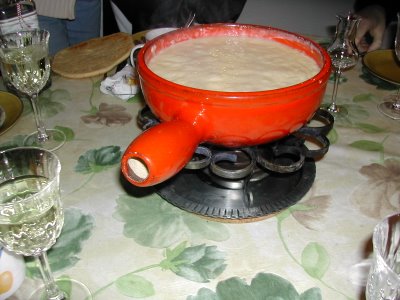
Fondue refers to several French Swiss communal dishes shared at the table in an earthenware pot ("caquelon") over a small burner ("rechaud"). The term "fondue" comes from the French "fondre" ("to melt"), referring to the fact that the contents of the pot are kept in a liquid state so that diners can use forks to dip into the sauce. The sauce is usually warmed by tealights. Though cheese fondues are the best known kind, there are several other possibilities for the contents of the pot and what is used for dipping.
INGREDIENTS:
1 medium clove garlic
2 cups dry white wine
1 pound Swiss cheese, shredded
1 teaspoon cornstarch
3 tablespoons kirsch or brandy
pinch ground nutmeg
dash hot pepper sauce
French bread or other crusty bread, about 2 loaves, cut into pieces (all pieces should have some crust)
Friday, December 08, 2006
"Der Geschmiedete Himmel" - The Sky Disc of Nebra
The highlight of a museum is an ancient astronomical disk called "Der Geschmiedete Himmel" or "The Sky Disc of Nebra".


The Sky Disc of Nebra and the Sun Chariot of Trundholm (Denmark), archaeological finds of world status, are the focus of attention in this unique display of the Bronze Age world.
The Sky Disc of Nebra - a bronze disc around 32 centimeters (12 inches) in diameter and weighing about 2 kilos (4.5 pounds) with gold-leaf appliques representing the sun, moon, stars and a ship- discovered in 1999, is one of the most important archaeological finds of the last century. The bronze disc with gold appliqués shows the oldest concrete representation of the cosmos to date worldwide and is thus a key find not only for archaeology but also for astronomy and the history of religion.
The Nebra Sky Disc that is seen as one of the most important archaeological finds of our time was stolen by treasure hunters who wanted to dispose illegally and seized in a spectacular police operation in Basel, the Switzerland in February 2002.
The priceless Nebra Sky Disc was originally deposited on the summit of the Mittelberg hill near Nebra in eastern Germany 3,600 years ago alongside with valuable swords, jewellery and tools.
Its discovery provides an opportunity to bring its era to life again!
According to the current interpretation, the sky disc had to be held up above the head and interpreted by looking up (at the sky).
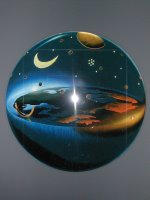
The find initiated a new presentation of the Bronze Age world in Central Germany. The natural riches of this region - copper, salt and fertile soils - formed the power basis for the resident Early Bronze Age princes, who exchanged goods from all regions of Europe. Mighty tombs, extensive bronze treasures, gold jewellery and unique display weapons survive as their status symbols.
Find more of its academic interpretation on these sites:
The artistic world construction of the Sky Disc of Nebra is based on mathematical principles
Interpreting the Bronze Age Sky Disc of Nebra using 3D GIS
It reminded me of Stonehenge in England. I am glad that I paid a visit to Stonehenge during my stay in England and speant a lovely afternoon there alone imagining ancient times.

Wednesday, December 06, 2006
Monday, December 04, 2006
Prague, Crezh Republic: 27 Nov - 29 Nov 2006


I attended an orchestra play at the National Theatre the first night of my stay in Prague, and a concert in a church the second evening. They were good experience. Nevertheless, I miss musical plays in London that I had been attending at least once a month, and even twice a week the last month of my one-and-the-half-year stay in England.


Tuesday, November 21, 2006
Digital Camera
I have a good impression of my Swiss friend's model of Canon Digital IXUS 800IS.
It is sold at 3699 Dennish Krones (equivalent to 335 British Pounds) in the largest camera shop in Copenhagen.
Checked online. There is Canon WP-DC5 waterproof case as I intend to have a new digital camera that allows me to do underwater photography when i go scuba diving.
Unbelievable! Searched online. The same model was only about 440 CHF (190 British pounds) in the Switzerland.
Copenhagen, Denmark: 19 Nov - 22 Nov
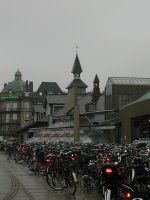
Denmark is another bicycle country.


The Little Mermaid was not as small as I heard of. I found the size and location of the statue in a cozy and artistic park at seaside in Østerport was just perfect.
Every Danish sailor who ever stood on a deck knows that the Øresund used to be full of Mermaids. The legend tells us that the home of all Mermaids was the Mermaid Banks in Øresund. The banks are no more but Copenhagen's own Little Mermaid is.
The Carlsberg brewer Carl Jacobsen was inspired to donate money to a sculpture after having seen "The little Mermaid" based on a fairytale by Hans Christian Andersen. The sculptor Edward Eriksen, sculptured her in bronze and his wife Eline Eriksen modelled. The story says that she is a sea king's half-human and half-fish daughter, who must wait on her rock for 300 years before she can enter the world of humans. She's been sitting here since 1913 so she still has a few more years to go.
We can only wait and see…
Nevertheless, the head of The Little Mermaid we see today is a transplant. Her original head was decapitatated and was storen.


Further down from the statue of The Little Mermaid towards a church in the park, that is a foundation shows the ploughing scene from an old legend in Nordic goddess of ferticity, Gefion, who was promised as much as land by the Swedish king Gylfe as she was able to plough in 24 hours. Gefion then turned her four sons into oxen and ploughed Zealand out of Sweden where the lake Vanern is situated today.
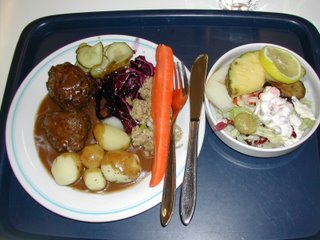
Danish companies have a tradition of providing breakfast and lunch in the office. My friends invited me to join them for lunch. Thus, I have the opportunity of exposing to Danish working environment and tasting Danish dishes.
The Danish monarchy is the oldest in the world. The Tivoli Amusement Centre located across the Copenhagen Central Centre is world wellknown although I just knew about it during my visit. :p It is recommended to visit at night because those lights broadcast from its decorations. Entrance Fee is required. Tivoli is a place of lights, which makes Tivoli a very special place to visit once it gets dark.
As the religious centre of Denmark, Copenhagen has quite a few churches which are architectural master-pieces commemorating the past history of Denmark and its royal family. Among those, I like the architect design of The Church of our Saviour specifically its exterior golden staircase winding up to the top where a golden globe is crowned by a statue of the victorious Christ. It is located in Christianshavn where is named after King Christian V, the first monarch on the Danish throne with absolute power. When inside the church, look up into the ceiling, where you'll see the chains of the Order of the Elephant and the Order of the Dannebrogen. Both decorations were instigated by King Christian V. The church's exquisite organ is supported by a relief of two elephants. (The Danish name for the Church is: Vor Frelses Kirke)
Real Friends
The familiarity! Warm hugs! And Trustworthiness!
They caress your incomfortability in travels and genuinely cheer you up to carry on!
When you are staying at your own old friends' house, you know that they are trustable. You don't have to keep all your valuable things such as passport and cash with you at all times as you do when you stay in a dormitory bed sharing with other backpackers or a hotel room.
My speechless heartfelt gratitude to my beloved friends who have been kindly and warmly sharing their genuine friendship with me! May all of you be blessed with Good Health and Happiness.
Sunday, November 19, 2006
A warm and lovely Malaysian-Swedish Family
Revisits Goteborg: 18-19 November 2006

When I visited Goteborg last Easter from Oslo, i reached Goterborg by bus in the morning and left in the late evening.
When I re-visits Goterborg on the 18th November 2006, I arrives in the evening and have to go back to Copenhagen the next day's morning.
I was blurred the first time and had absolutely no idea about its town structure when I arrived Goterborg. But for the second visit, I have got a clearer idea about direction I should head to.
I arrived Goterborg (Sweden) fm The Hague (The Netherland) by having changed buses twice at Hamburg(Germany) and Copenhagen (Denmark).
Saturday, November 18, 2006
Amsterdam


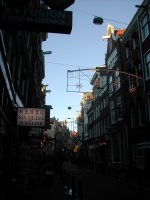


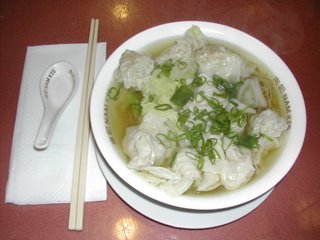
They are so many bicycles in the Netherland. Ladies dressed elegantly in nice dresses with high boots also ride bicycles.
Amsterdam is relatively a new city in Europe with 800 years of history. Dutch people in the old days were sailors or merchants. They are canals in Amsterdam.
The Dutch Government tends to be liberal. Drugs and prostitution are run legally in the Netherland.
The Netherland has many Chinese shops. I had a bowl of wan tan noodle soup that was authentic and only cost 7 euro in the China Town, Amsterdam yesterday's afternoon. I like the restaurant because it was not decorated as a luxurious restaurant but a traditional local shop.
China Town in Amsterdam is located just next to Red Light District.
I learnt that mushroom is also a type of drug.
Coffee shops don't sell coffee. Coffee shops are shops for people to smoke joints. If you want to drink coffee, don't step into "coffee shop", but "Coffee Company Shop".
I have mixed feeling towards Amsterdam.
So far, all Dutch people I have interacted with are patient, friendly and very helpful. They speak fluent English because they are many big international companies in the Netherland. For example, the headquarter of Saudi-stated-owned company which is the richest oil company in the world - Aramco is located in the Netherland because of the Netherland's tax redemption benefits.
Those canals in Amsterdam has made the city cozy and attractive whereas streets are narrow that cause traffic jam. Public transport like trams and buses are conveniently available.
The main reason I hold mixed feeling towards Amsterdam is its legally run drug activities and red light district. If i am a tourist for merely a short visit, I may be thrilled to see such activities. However, if i live in the town for a long period, I would think twice for the security of the town.
Thursday, November 16, 2006
"Travelled" 4 countries in 24 hours!
I have unexpectedly have had very good impression about Dutch people. So far, I have been meeting friendly and very helpful people upon my arrival.
Hahaha, you know what! No use of toilet in the long drive bus journey!!!!!
Thanks for the journey fm Barcelona to Amsterdam, I "travelled" 4 countries - Spain, France, Belgium and the Netherland - in 24 hours (the bus journey took 2 hours more, so 26 hours due to traffic jam in highways in Amsterdam)
When i was moved in the bus, I "dropped by" several cities, namely Lioret de Mar, Figueres, Luxembourg, Reims, Lille, Kortrijk, Gent, Brussels, Antwerpen, Utrecht, Breda, Rottermdam and then finally arrived Amsterdam. :encore:
Because of this bus journey, i re-visited Lille (France) and Brussel (Belgium). It was raining AGAIN in Belgium! Nevertheless, leaves have turned more colourful and thus atmosphere was more romantic. I wanted to take photos of those sentimental autumn leaves, however, I could only admire this nice view through window fm the bus.
Wednesday, November 15, 2006
Lively Barcelona
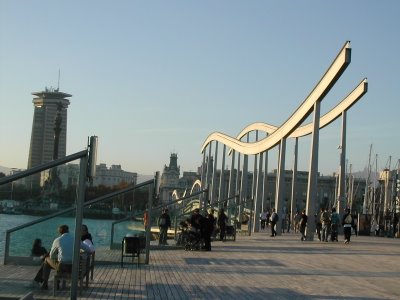
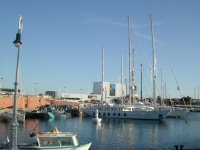


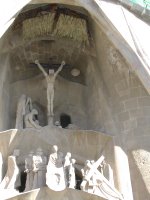

Barcelona tends to have unique architect building design. For instance, La Sagrada Familia, Casa Batllo, Casa Calvat, Pabellones Guell, Colegio Teresianno, Casa Vicens, Park Guell, Casa Mila - La Pedrera and its wood bridge at Barcelona harbor located at Barceloneta.
The construction of La Sagrada Familia has been started since 1883 and until today, its building that has taken 130 years has yet to be completed. It is one of the major attractions of Barcelona.
Barcelona has interesting night life to offer especially those pubs, bars and discos located in Olimpica that is near to beach site. Night life in Barcelona starts from 12 midnight. Those night shops are open until 4 a.m. as understand from a local friend.
I particulary like the wood bridge architect design in Barceloneta harbour. It has helped to make the life in Barcelona more relaxing.
Ohya, Paella is offered at special price every Thursday in all restaurants in Barcelona.
Barcelona to Amsterdam
When i got my bus ticket, the departure is 1745. I asked the ticket counter the arrival time.
"1745"
"What time will i be arriving Amsterdam?"
"1745"
"What i mean is time of arrival, not time of departure"
"The bus journey is exactly 24 hours, miss."
:-S
Sunday, November 12, 2006
Madrid, Spain: 10-14 November 2006


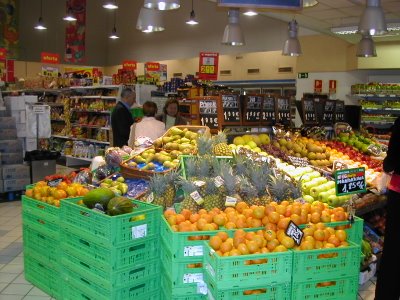
I have long got good impression abt the Spanish people. Now after having been in Madrid, I have even developed better impression. In general people are warm and friendly, streets are clean, fresh vegetable, fruits and seafood are easily available. Cost of living is relatively lower than those in England and France, whereas i personally quality of life is better in Spain than England and France.
Saturday, November 11, 2006
Saudi culture vs Japanese culture
Among those, the Japanese stay back in the office until late evening; but the Saudi leave the office punctually.
The Saudi must bring the whole family when they are on a long period overseas assignment; whereas for the Japanese, they go overseas alone with their family remain in Japan.
The Japanese bow to each other when they meet. The higher degree one bows, more respect is transmitted. Whereas, the Saudi cium each other's cheek when they meet. The more cheek ciuming is, the closer brotherhood is shown.
Haha, one more: Generally, the Japanese like to drink, but officially the Saudi can't drink at all because of religious reason.
Thursday, November 09, 2006
Cathedrale Saint-Denis
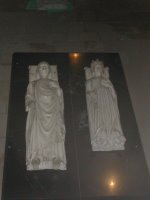


I visited an ancient site called Cathedrale Saint-Denis in North Paris. It is the place of burial for the kings of France since the 7th century. It houses over 70 sculpted tombs, including those of Dagobert, Francois I, Catherine de' Medici and Louise XVI. It has been considered as one of the principle masterpieces of Gothic art.
06-09 November 2006: Paris, France
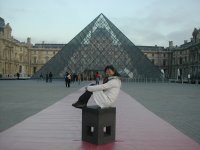





I supposedly have left for Madrid yesterday's afternoon but i have extended one more day (as Musee de Louvre was closed every Tuesday when i wanted to make a visit) and will be leaving Paris this afternoon.
My left knee is decorated with the colours of pupple and red. I couldn't walk as convenient as i wished. My shoulders are in pain too. Nevertheless, miraclely they were okay when i did sightseeing but not after :)-

I bought two comprehensive books over the collections of the Musee de Louvre. Wow, these two books are really heavy.
Paris, instead of Rome, would be the "best" city i have visited if the people in general are friendlier and more polite, and the city could be cleaner.
In terms of country, the Switzerland is indisputably the best country I have been visited. The whole country is in tune with nature, people are friendly, places are clean, indeed every city carries its distinguish features.
Nevertheless, I find Paris is more interesting than London (excepts the offer of musical plays). Most attractions in Paris are respectively huge historical buildings with very fine architectural arts.
I was in the Eiffel Tower every night excepts the first night commuted fm Lille to Paris.
I am very much impressed by the architectural design of most buildings and city structure in Paris.
I like the creative architectural design of Eiffel Tower and the Musee de Louvre. Among all, the look of the Arc de Triomphe from the corridor along the "Pencil Tower/Statue" to the Musee du Louvre was marvelous. As the Arc de Triomphe becomes bigger when i move further away from it. Why?
I wish to have a day in Versailles, but it will be not in this trip as they are so many places worth to see in Paris and each place inquires long hours to admire to obtain a better understanding instead of merely a sightseeing.
I went to Basilique Royale de Saint-Denis this morning. This ancient burial for the kings of France since the 7th century is also one of my recommendations to spend a few hours there.
Among those, namely, I visited the Conciergerie, the Sainte-Chappelle, Tours de la Cathedrale Notre-Dame de Paris, Arc de Tiomphe de l'Etoille, Basilique Royale de Saint-Denis, Les Invalides, The Opera, the Montmartre Basilique du Sacre-Caeur.
In the evening after i covered main historical attractions, i walked through popular shopping streets, but sorry that i only know their names in the Chinese Language which one the street famous for branded brands and one was called ParisSpringShoppingCentre. I didn't have the time to go in (Haha fortunately) as my top priority are nature, culture, history and arts.
A Singaporean lady whom i met in the Musee De Louvre showed me three bags she bought today. One cost 200 euro and a small one cost 60 euro. She said she would go back to buy two more tomorrow that she has been regretting for not having bought today!
I joined a guided-tour in the Musee de Louvre in the beginning before i did a few hours on my own. They were people sitting in a corner sketching. Although I didn't have such talent, I could sit and admire a piece of arts for long hours. When I was in the Stonehenge, I rounded those stones three times and sat on the ground for the whole afternoon.



